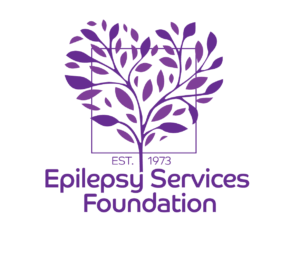Resources / Education
ESF Intake Form
Is your family looking for support as you navigate a diagnosis of epilepsy or seizure disorder? Are you looking to connect with other families who have a child with epilepsy? Complete our intake form so that we can serve you better and provide the resources and activities that would be most helpful to your family.
Demographics
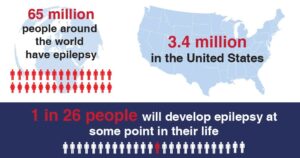
Incidence*
- Each year, approximately 150,000 or 48 out of 100,000 people will develop epilepsy.
- The incidence of epilepsy is higher in young children and older adults. This means that epilepsy starts more often in these age groups.
- 1 in 26 people in the United States will develop epilepsy at some point in their lifetime.
Prevalence*
There are many different estimates of the prevalence of epilepsy. These numbers vary depending on when the studies were done, who was included and a host of other factors.
- The number of people with epilepsy ranges from 1.3 million to 2.8 million or 5 to 8.4 for every 1,000 people.
- The estimate currently thought to be most accurate is 2.2 million people or 1 for every 1,000 people.
- However, higher numbers of people report that they have active epilepsy, 4 out of 1,000 people.
Florida
- It is estimated about 400,000 persons in Florida have epilepsy.
- It is estimated about 60,000 persons with epilepsy live in West Central Florida and 16,000 of these individuals are children, teens and young adults.
What is Epilepsy?
Epilepsy (seizure disorder) is a neurological condition which affects the nervous system. It is usually diagnosed after a person has had at least two seizures that were not caused by some known medical condition.
What are Seizures?
Seizures seen in epilepsy are caused by disturbances in the electrical activity of the brain. The seizures in epilepsy may be related to a brain injury or a family tendency, but most of the time the cause is unknown.
Local Community Resource Guide
Pediatric Epileptologist
| Pediatric Epilepsy Neurology Specialists | 813.873.7367 | Tampa - Directions |
| Maria Gieron, M.D. | 813.844-7900 | Tampa - Directions |
| Daniel Cabello, M.D. | 727.443.3295 | Clearwater - Directions |
| Dr. Eric Vernier – Capernaum Medical Center ( | 863.232.4323 | Tampa - Directions |
Pediatric Neurologist
| Jose Foradada, M.D. | 813.874.2000 | Tampa |
| Sergio Jacinto, M.D. | 813.876.4100 | Tampa |
| Richard Gunderman, M.D. | 813.879.7816 | Tampa |
| Ernesto Millan, M.D. | 813.448.6755 | Tampa |
| Radhakrishna Rao, M.D. | 813.876.3783 | Tampa |
| Raymond Fernandez, M.D. | 727.498.8994 | Tampa |
| Joseph Casadonte, M.D. | 727.498.8994 | St. Petersburg |
| Ena Andrews, M.D. | 727.498.8994 | St. Petersburg |
| Musarrat Qureshi, M.D. | 863.687.1600 | Lakeland |
| Eberto Pineiro, M.D. | 863.680.7300 | Lakeland |
| Terry Hostler, M.D. | 863.293.2107 | Winter Haven |
National
ESPY
Transportation Options

In addition to using a car, bus, train or bicycle, there are other transportation options for persons with epilepsy in the West Central Florida area.
Uber has a rideshare app. There is a low cost: about $5-7 to ride almost 3 miles. Ask you doctor if they offer UberHealth.
Lyft has a rideshare app. The cost: $0.90/mile plus a service fee of $1.90. Minimum fare is $3.50. Ask your doctor if they offer Lyft Concierge.
TBARTA is a carpooling service. This ride sharing company is only for persons employed and who need transportation to and from work. A person receives a personalized computer match-list of persons who live and work near the person needing this service. Cost is determined by the company. You register on-line: www.tbarta.com/en/carpooling/commuter/carpool You can also call TBARTA for information at 1.800.998.7433.
Carpool World is another carpooling service. It is similar to TBARTA except that the cost is decided between the persons and not the company. You register on-line: https://www.carpoolworld.com
Mercy Medical Angels provides assistance in the air with commercial airline tickets and volunteer pilots, and on the ground with gas cards, bus and train tickets.
What is Epilepsy? What are Seizures?
Epilepsy (seizure disorder) is a neurological condition which affects the nervous system. It is usually diagnosed after a person has had at least two seizures that were not caused by some known medical condition. Epilepsy affects every person differently depending on age, types of seizures, response to treatment and whether or not the person has other health issues, etc. Epilepsy affects persons from all communities, many of whom do not have any family history of seizures.

Seizures seen in epilepsy are caused by disturbances in the electrical activity of the brain. The seizures in epilepsy may be related to a brain injury or a family tendency, but most of the time the cause is unknown.
Diagnosis & Treatment
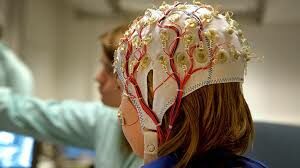 While the diagnostic process will vary for each person, the major steps in the process should include:
While the diagnostic process will vary for each person, the major steps in the process should include:
- Detailed medical history – may include questions regarding the mother’s pregnancy and delivery, any relatives with epilepsy, and whether the person had a high fever, serious head injury and/or periods of staring, inattention or breath-holding.
- Detailed account of seizure – the person(s) who was present at the time of the individual’s seizure is advised to communicate what (s)he saw with the doctor.
- Physical examination – the exam may include assessment of cardiac, neurological and mental status.
- Blood test – a blood test(s) may be ordered to identify potential causes and/or identify other significant illness(es).
- CAT (Computerized Axial Tomography) or CT Scan – may be ordered to determine whether a seizure has been caused by an acute neurological lesion or illness.
- EEG (Electroencephalogram) – shows the brain wave activity that can be used to assess the risk of seizure recurrence, and it may also help determine seizure type.
- MRI (Magnetic Resonance Imaging) – a preferred brain picture when evaluating persons with new onset seizures or seizures that may have started in a particular area of the brain.
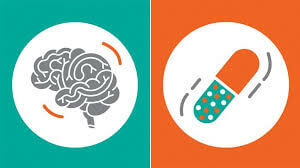 There is not one best treatment for epilepsy. There are, however, a number of treatment options available:
There is not one best treatment for epilepsy. There are, however, a number of treatment options available:
- Medications – the most common treatment option. There are more than 30 medications used to treat generalized and partial seizures. Doctors will work with their patients to determine the best medication option(s).
- Ketogenic Diet – a strict diet that helps stop or control seizures for some persons (usually children under the age of six). This diet must be closely supervised.
- Vagus Nerve Stimulation (VNS) – a small battery implanted under the skin in the chest wall that sends small, regular bursts of electrical energy to the vagus nerve, a large nerve in the neck that leads directly to the brain.
- Surgery – this option is most commonly used when the brain tissue causing seizures is confined to a small focal area of the brain, which can be safely removed without damaging function.
- Biofeedback – is used to help modify seizures by slowing one type of brain activity, while increasing another.
The goal of all epilepsy treatments is to STOP THE SEIZURES with as few side effects as possible.
Types
Key Points about Seizures
- A single seizure may not be epilepsy.
- In seizures consciousness may be lost fully, partly or not at all.
- Seizures vary greatly between people.
- Most major seizures last from 1-3 minutes.
- Triggers include excess alcohol, skipped meals and missed sleep.
- Absences are staring spells often mistaken for daydreams.
- Some seizures feature wandering, confusion or agitation.
- Prolonged seizures are treatable with emergency medication.
- Seizures occur when normal brain activity is briefly disrupted.
- Our brains work on electrical impulses.
- Too much electricity can lead to seizures.
- Seizures are short and usually stop naturally.
- Not all seizures are the same.
- Not all seizures are due to epilepsy.
Seizures+Triggers
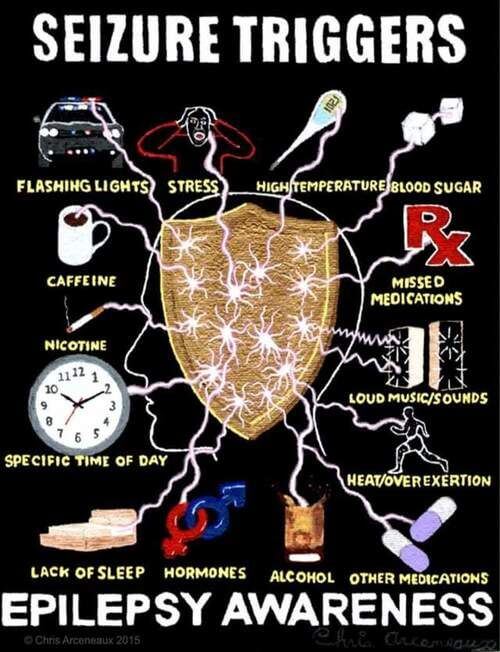
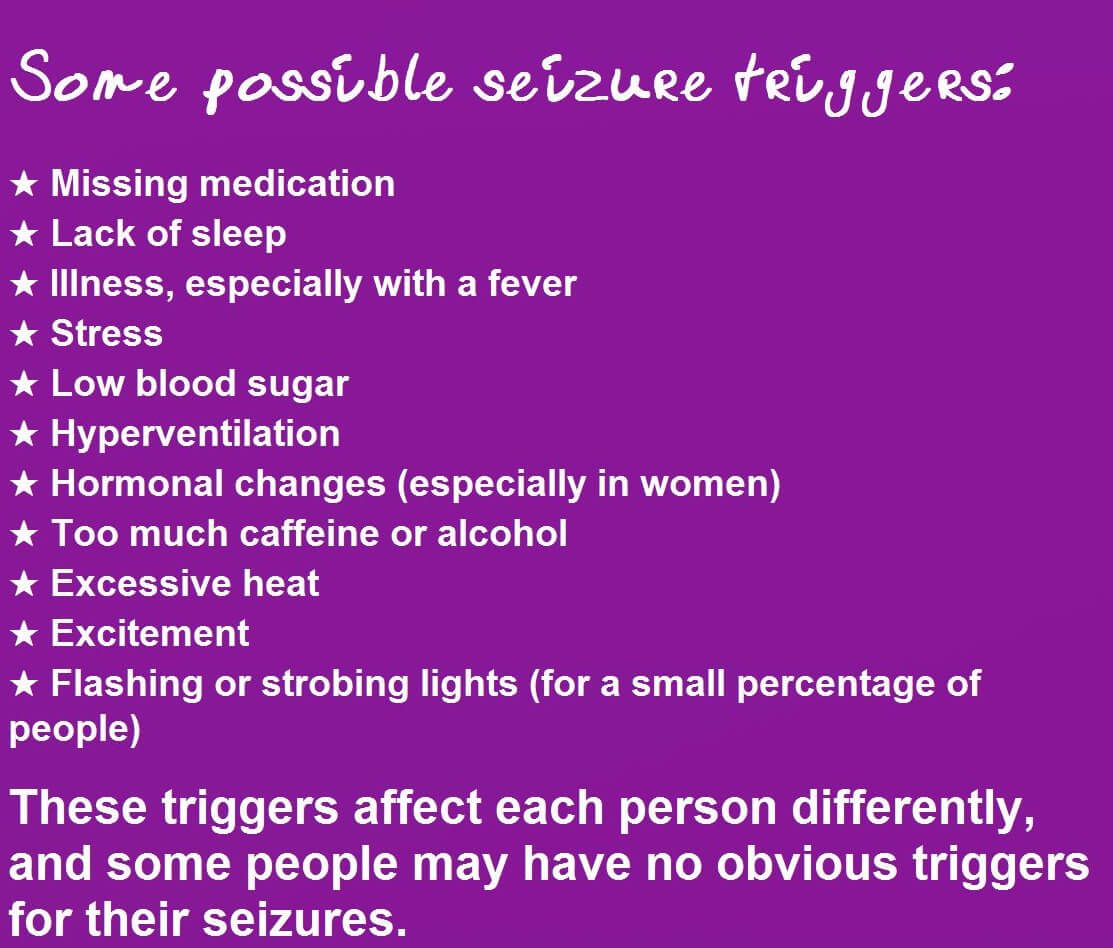
Transitioning to Adult Care
If you have a teen or pre-teen who will soon be transitioning from pediatric to adult care, you may have many questions on how to make this transition as smooth as possible. Click the link below to access some helpful resources!
Service Dogs & Devices
Epilepsy Service Dogs and Training
- Canines 4 Hope – Palm City, Florida 1.855.885.6262 Provides dog and dog training Cost: $10,000 Family must fundraise the money or pay the money
- Canine Assistants – Georgia Provides dogs for free Waiting time may be 1-5 years
- 4 Paws for Ability – Xenia, Ohio Process: Apply and interview, enter a contract, fundraise to pay for dog, class placement and service dog training, uniting client and service dog
- Pendragon Acres – 15006 Eckerley Drive, Brooksville, FL. 34614 Process: Call 352.596.3414. Pendragon trains German Shepherds as service dogs. They match the dog to your needs. Please let owners know you were referred by Amanda & Joey Vega. Cost: Unknown
- Inghram’s Sit ‘N Stay Dog Academy – 10401 Wilsky Boulevard, Tampa FL. 33625 Process: Call 813.961.0052. Inghram’s trains service dogs. The academy is APDT certified and associated with Paws for Hope, a program that trains dogs for disabled veterans. Cost: Unknown
- Kids and Canines – Dorothy Thomas Center – Tampa FL. 33618 Process: Call 813.558.5406. This is an assistance dog training program, gives middle school teens a new “leash” on life. Each student is paired with a dog in order to train the dog to be a helpmate to an individual with disabilities, or a child with autism. Cost: Unknown
Seizure Detecting Devices
Empatica – The Embrace wristwatch was developed by Empatica, Inc. The watch is able to detect seizures in persons with epilepsy and can alert a smartphone app or a “companion” watch worn by a parent, spouse, roommate, or anyone who will be close to the wearer when seizures are likely to occur. The watch also measures stress levels which can trigger seizures.- Cost: Approximately $199.
- www.empatica.com
- Cost: go to www.smart-monitor.com
- For more information, visit SAMi’s website at www.samialert.com.
- SAMi pricing: $399



